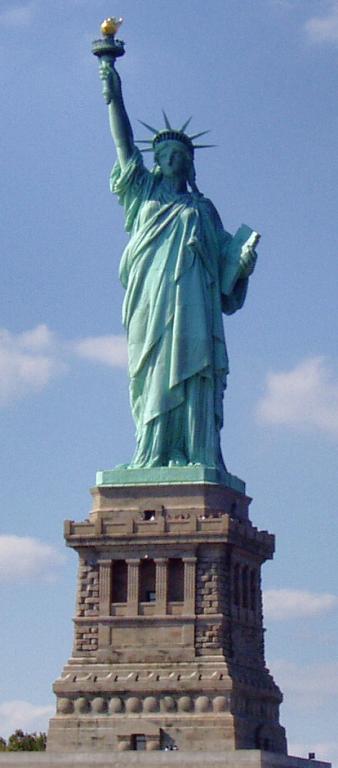
(Wikimedia Commons public domain image)
***
The New Colossus
Not like the brazen giant of Greek fame,
With conquering limbs astride from land to land;
Here at our sea-washed, sunset gates shall stand
A mighty woman with a torch, whose flame
Is the imprisoned lightning, and her name
Mother of Exiles. From her beacon-hand
Glows world-wide welcome; her mild eyes command
The air-bridged harbor that twin cities frame.
“Keep, ancient lands, your storied pomp!” cries she
With silent lips. “Give me your tired, your poor,
Your huddled masses yearning to breathe free,
The wretched refuse of your teeming shore.
Send these, the homeless, tempest-tost to me,
I lift my lamp beside the golden door!”
Emma Lazarus
2 November 1883
***
Like most Americans, I’ve been horrified by the scenes occurring in Afghanistan and appalled by the glaring incompetence of the Biden administration in handling the withdrawal of United States military forces. Watching the president’s performance and the performance of his administration doesn’t exactly fill me with confident optimism for challenges ahead. As one retired general pointed out a few days back on CNN, we could easily have placed a cordon around Kabul and explained to the Taliban that (a) it would be there until at least the time that we had extracted the Americans and the Afghans whom we desire to evacuate from the city and that (b) if they drew within, say, fifteen miles 0f the city limits, we would obliterate them. Instead . . . Well, you’ve seen it on your television screens.
Most critics of the execution of the withdrawal think, nevertheless, that exiting “America’s longest war” was long overdue. I’m not at all convinced even of that. Instead, I agree on this issue with Rep. Dan Crenshaw (R-TX), who points out that we had only a relative handful of troops in Afghanistan, most if not all of them volunteers (not conscripts), and that they have been doing an excellent job in carrying out the real mission of U.S. forces in the country: They have prevented al-Qa‘ida and others from being able to use Afghanistan as a staging area for attacks on the United States and on the West. Moreover — and this is both striking and significant — they have not sustained a single casualty for the past eighteen months. See his article in the Wall Street Journal:
Sadly, Afghanistan is once more available as a potential base for Islamist terrorist organizations. But that’s out of my hands. We won’t have another national election until 2022, and we won’t have our next presidential election until 2024. And I’m not convinced that the Republican Party as presently oriented is a serious, principled opposition party.
That’s probably much closer to politics than I ought to have come. So let me shift here to a different level of reflection:
It may again be time for Americans to “think globally but act locally”:
“Are Afghan refugees fleeing the Taliban regime headed to Utah?”
I’ve been distressed, frankly, to see at least one commenter on my blog demand, as I understand him, that our country refuse to admit Afghan Muslim refugees. I assume that he’s referring even to the translators and others who have helped the United States in Afghanistan and whose lives (and whose families’ lives) are now in grave danger under a renewed Taliban regime. By contrast, I regard giving such people aid and sanctuary as a matter of national honor, to say nothing of it being a prudent measure so that potential future allies will have reason to trust us rather than to fear that we’ll cut and run and abandon them to our common foes.
I understand the need for vetting, of course. If I were a mullah of the Taliban contemplating future terrorist actions on American soil, I would be seeking to smuggle my operatives in among the exiles. What could be better than to have the United States itself cover the transportation costs of its avowed enemies?
There seems no compelling reason to bar Muslims from our shores if they’ve been adequately vetted. However, when asked to justify his proposed religion test for immigrants — a test that, in my view, could not possibly pass constitutional muster (see, on this, “Amici Curiae Brief by Scholars of Mormonism Opposed to Trump’s Refugee and Immigrant Ban,” to which I was a signatory) — this particular reader argues against allowing Afghan Muslim refugees to come to our homeland by pointing to Ilhan Omar (D-MN, born in Mogadishu, Somalia) and Rashida Tlaib (D-MI, born in Detroit, Michigan [!]). But surely the problem with these two, of whom I myself am far from a fan, is not their Islam but, rather, their extreme leftist political ideologies.
But care for refugees is also a Gospel obligation and a basic principle in the teaching of Jesus Christ. I remind you in this context of one of the greatest talks given in a session of the General Conference of the Church of Jesus Christ of Latter-day Saints since I’ve been listening:
***
Incidentally, hearing the word Taliban used as a singular (e.g., “The Taliban is not trustworthy” or “The Taliban is tightening its grip on the Afghan capital” grates on my ears like the proverbial fingernails on a chalkboard. The easiest way for me to explain why is simply to quote Wikipedia:
“The word Taliban is Pashto, طالبان (ṭālibān), meaning ‘students’, the plural of ṭālib. This is a loanword from Arabic طالب (ṭālib), using the Pashto plural ending -ān ان. In Arabic طالبان (ṭālibān) means not ‘students’ but rather ‘two students’, as it is a dual form, the Arabic plural being طلاب (ṭullāb)—occasionally causing some confusion to Arabic speakers. Since becoming a loanword in English, Taliban, besides a plural noun referring to the group, has also been used as a singular noun referring to an individual.”











